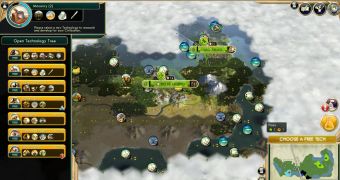Brave New World is a big expansion, crammed with new game concepts and options, and it can be daunting for even seasoned Civilization players to tackle all the innovation while also keeping their competitive edge.
Firaxis compounds the problems by also introducing ten new civilizations, each of them specifically designed to test the very limits of the game, and by making good old France a viable choice for a culture-based victory.
I initially wanted to play as Venice, which can only win by creating an empire of subjugated city states, or as the Shoshone Indians, but I finally settled for a more mainstream choice and picked Brazil.
Their unique Carnival, which replaces the normal Golden Age and offers a boost to the importance of great works of culture, is an interesting mechanic and they otherwise seem suited for a variety of play styles.
After founding a few cities and eliminating some of the barbarian camps around me, I was faced with my first decision linked directly to Brave New World features: should I invest in a caravan and its unique associated building or not?
Trade is the new lifeblood for most economies, a simple way of gaining gold that can be quickly converted into influence, buildings or units.
At first, the caravanserai building and the associated caravan can be pretty expensive and it’s tough to know exactly when to delay a big wonder in order to build them.
Trade is initially powerful as long as you have another big empire at a medium distance with the ability to keep its own territory free of barbarians.
As Civilization V progresses, internal routes also become important because they give players a simple way to boost cities with food or production.
I finally decided to create that caravan only to have my route raided soon after launching my first voyage to Jakarta.

 14 DAY TRIAL //
14 DAY TRIAL //